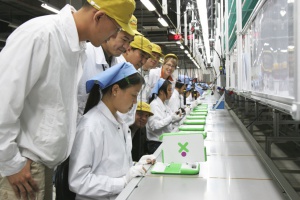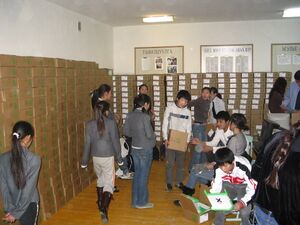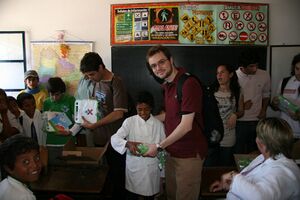The OLPC Wiki: Difference between revisions
m (→Focus) |
Dialectric (talk | contribs) m (minor grammar fix) |
||
| Line 13: | Line 13: | ||
* [[OLPC:Webpage corrections needed|Webpage corrections needed]]: requesting to update OLPC's websites |
* [[OLPC:Webpage corrections needed|Webpage corrections needed]]: requesting to update OLPC's websites |
||
* [[How laptop delivery breaks]]: on-going report on the G1G1 delivery trouble |
* [[How laptop delivery breaks]]: on-going report on the G1G1 delivery trouble |
||
* [[Help talk:Bulletin board|Bulletin Board]]: any comment to this wiki |
* [[Help talk:Bulletin board|Bulletin Board]]: any comment specific to this wiki |
||
== What's new == |
== What's new == |
||
Revision as of 15:38, 19 January 2008
| english | عربي | پښتو | български | deutsch | español | français | kreyòl ayisyen | italiano | 日本語 | 한국어 | монгол | Bahasa Melayu | नेपाली | norsk | português | română | русский | kinyarwanda | türkçe | 中文 | 繁體中文 | HowTo [ID# 99038] +/- |
Welcome to the OLPC Wiki, a collaborative site about the One Laptop per Child project and related communities. We currently have 9,909 pages; please join us and share your ideas. For a project overview, see also www.laptop.org.
For developers, there is a development site for tracking bugs and browsing source code, dev.laptop.org.
For XO users, we have an online Getting Started Guide; for more detailed help with your XO, please visit our XO Help and Support FAQ pages.
Focus
- Webpage corrections needed: requesting to update OLPC's websites
- How laptop delivery breaks: on-going report on the G1G1 delivery trouble
- Bulletin Board: any comment specific to this wiki
What's new

Weekly updates: Current events · Archives: Old News.
- Krstić explains what OLPC is doing with the Microsoft Windows XP team.
- An OLPC response to The Economist "Clunky Laptop" article.
- Bunnie "tears down" an XO laptop... worth the read.
- Read an interview with former OLPC CTO Mary Lou Jepsen on Groklaw
- Our "Preliminary Objection" regarding the Nigerian Keyboard
- OLPC's statement in regard to Intel's resignation from the OLPC board and association.
- The Give One Get One program concluded on 31 December 2007. Thanks to all who participated!
- The Chicago Tribune has a wonderful AP article on how the XO laptop and OLPC are transforming a remote Peruvian village.
- Mary Lou Jepsen has begun posting our many safety and inspection certificates on the Hardware Testing page.
- We've only just begun. Uruguay has started the first mass-production deployment of OLPC! (See Ivan Krstić's blog for more details.) Next stop: Peru.
Notes on G1G1 shipment
Post-January 15th update: We continue to work hard to ship all XO Laptops. Shipments to Canada have begun—if you live in Canada, you should receive your laptop in the January/February time frame. Most laptops to US-based donors have already shipped. You can check on the status of your laptop by visiting www.laptopgiving.org. You will need your reference number or the email address you used when donating. If you are unable to track your laptop, please contact OLPC Donor Services by calling 1-800-201-7144 for assistance. (We've been assured that hold times are greatly reduced.)
About One Laptop per Child
— Nicholas Negroponte |
This is the wiki for the non-profit One Laptop per Child association. The mission of this association is to develop a low-cost laptop—the "$100 Laptop"—to revolutionize how we educate the world's children. Our goal is to provide children around the world with new opportunities to explore, experiment, and express themselves.
Why do children in developing nations need laptops? Laptops are a window and a tool: a window into the world and a tool with which to think. They are a wonderful way for all children to learn learning through independent interaction and exploration.
OLPC espouses five core principles: (1) child ownership; (2) low ages; (3) saturation; (4) connection; and (5) free and open source.
see also: more about the Laptop and OLPC's vision for learning.
Want to know more? Perhaps get involved?
A good place to start is the One Laptop per Child page, which gives an overview of the project. There is a list of frequently asked questions (FAQ); a place to ask a question; places to get involved, participate and current job openings; We can use some extra help translating and preparing content bundles in general, for example. There are numerous pages on hardware, software, content, and the developers program—and a separate wiki for software development. The XO's interface, Sugar, has its own interface guidelines. There are also discussion pages on issues of deployment and country-specific discussions. An extended table of contents is also available.
If you want to try out the laptop, you can emulate the XO on your PC.
OLPC is also carefully filling some full-time positions.
About this wiki
The dual purposes of this wiki are to both share information about the project and to solicit ideas and feedback. The articles and discussion vary from technical to epistemological.
We invite comments on every page; please leave a comment by using the discussion tab found at the top of each page in the wiki. Edits to the article pages themselves should be limited to facts, not opinions. Please sign your comments: make an account and use ~~~~ as your signature.
Pages that include the {{OLPC}} template—such as this one—are maintained by the OLPC team; these pages are generally representative of the current state of the project; other pages—created and maintained by the community—should be read with that in mind. While you are welcome to edit and add information to OLPC-maintained pages, please be sure to login before doing so.



